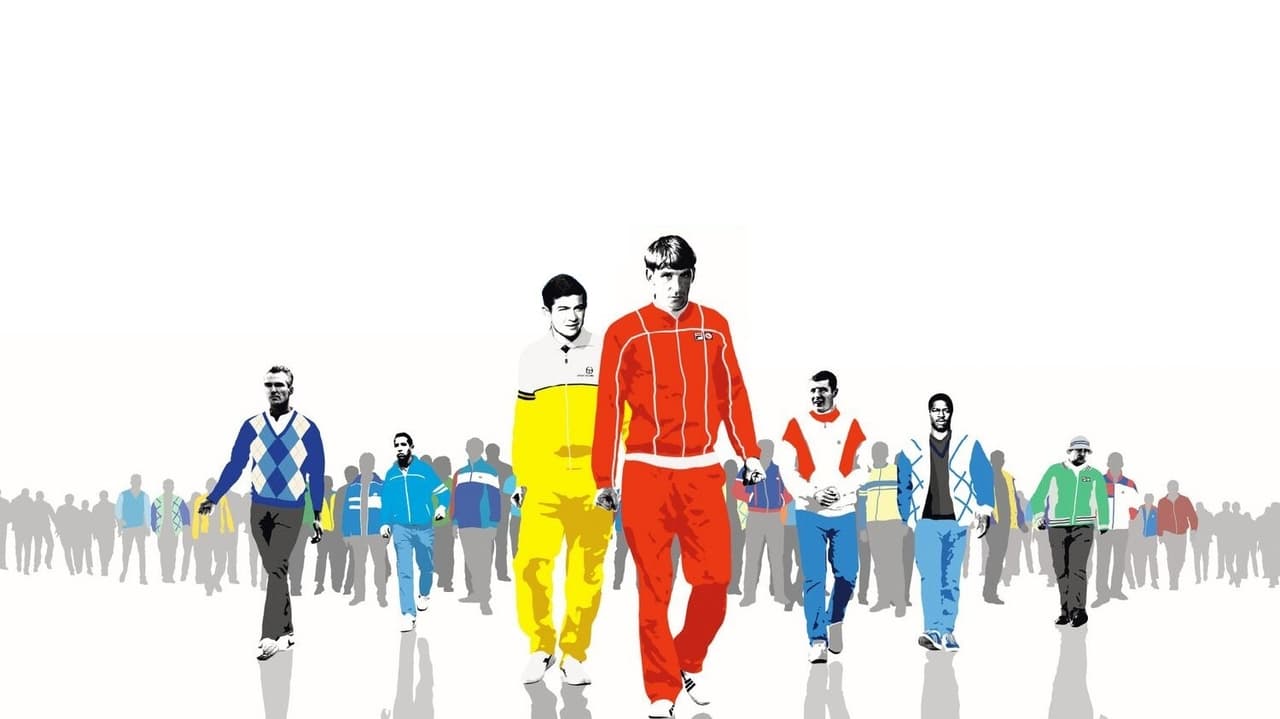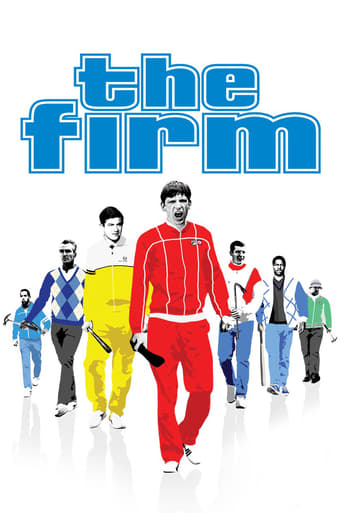

everything you have heard about this movie is true.
... View MoreWhile it doesn't offer any answers, it both thrills and makes you think.
... View MoreIt's a good bad... and worth a popcorn matinée. While it's easy to lament what could have been...
... View MoreOne of the most extraordinary films you will see this year. Take that as you want.
... View MoreWhy would anyone want to re-make Alan Clarke's The Firm? I don't think Alan Clarke would've liked this rubbish at all. It is an insult to his work. And you cannot replace Gary Oldman, he was great as Bex. The other bloke was pathetic! The original 'The firm' was a great film with some great British actors in it. Alan Clarke was a great director and there was no need to have a go at re-makin this film. Scum was a classic, I bet Nick Love wouldn't fancy re-makin that (actualy, some one has re made that film in America and called it 'Dog Pound' Unfortunately). Also I don't remember anyone wearin a full yellow Tachini (sorry, probably haven't spelt that right) track suit in the 80s or those stupid shorts he had on in the club at the beginnin. It was just dreadful. I really had to force myself to watch it right until the end.
... View MoreLike a lot of people, when I first heard the news that Nick Love was "updating" the original version of The Firm I anticipated the worst. My objection lay not so much in the fact it was a remake of a classic film, but more as to why we needed yet another film centering on football hooliganism.The argument that such material merely glamorizes the violence it depicts, (appealing as it does to a section of youth that also worship the fashion and lingo of the genre) is without question. The worst example of which (and still prominent in most bargain bins of HMV up and down the land) would be the truly execrable "Green Street". A film so inept in its plotting, acting and overall plausibility that you'd be forgiven for thinking the whole thing had been stitched together by a gang of football thugs themselves.Contrary to what director Lexi Alexander may think, this was a film that at every opportunity served to heighten the voyeuristic delight of its male, teenage demographic. Self conscious fight sequences shot through with booming dance interludes, whilst a preoccupation with all things bloody gave way to an orgiastic ending which was more like a scene from Braveheart than a realistic portrayal of football mob violence.Which brings us back to Love and The Firm. What immediately strikes here, as it does in "Goodnight Charlie Bright", and "The Football Factory" is the skill and accuracy with which Love conveys his subject matter.The film is also a far warmer and optimistic piece than anything Love has made so far. Central character "Dominic" shares an all too believable rapport with his father, forever wrangling money from him, whilst both parents playfully tease him throughout the film - trying their best not to cramp his style when a friend catches Dom at his local sports store.It is this held focus on the family, combined with the way in which Dominic is positioned when the violence first unfolds (felled by a single punch and then little more than a terrified witness for the remainder of the film)that make for a clear mission statement on the behalf of the director.The scenes of violence here must also be commended for their reserve and authenticity. Thanks to Love's impeccable eye for the 1980s, the sense of watching a documentary on football violence runs close at times, with the camera skittering about to capture snatches of fight that never quite take off as quite accurately, the police intervene - with their standard uniform and makeshift formation, capturing them in flux before the later arrival of CCTV and full riot gear.This lends real tension to these scenes. Yet Love has no agenda here other than to show how quickly such altercations are broken up and how they often amount to little more than benign screaming matches. Even the more "laddish" Football Factory tended not to dwell on the full scale chaos between its football gangs and Love has clearly kept this in mind with The Firm.It must be said however, that the film hardly breaks new territory. (within what is already a very limited genre) Though there is no question that the look and feel of the era has been captured brilliantly and that as top boy "Bex" Paul Anderson is suitably charged, with its rather obvious ending - an eye for an eye simply meaning someone will end up losing their head, it is at least a refreshing twist to see Love's championing of the values of friends and family over the raging poison of the hooligans themselves.
... View MoreIt has no soul, no heart. It's empty, absolutely one of the worst films I've ever seen.You can't help but compare it against the original, but even taken in isolation this stinks to high heaven.Several scenes stand out for a complete lack of any actual emotion, and for a subject that's suppose to be about intensity, just that raw emotion, that's really quite staggering !! How any film with such a passionate subject could somehow manage to completely avoid invoking any passion - I just can't describe. It's like it was made as some sort of joke, perhaps ?The fight scenes are a ham-fisted joke, the confrontation between Snowy and Bex actually had me laughing it was so awful."Put your hands together for..... Stanley" ?It's the nearest to a round of applause this tripe will ever see.Absolutely awful - all involved should be thoroughly ashamed.If you're a film student perhaps, it's worth a look. File under "How not to do it".
... View MoreHere's a Nick Love joke: two teenage boys are leaning against a wall. One says to the other, "I should stick a Tampax in you." "Why?" "Cos you're a c***." If you enjoyed that, here's another joke for you: Nick Love's The Firm - a remake of the late Alan Clarke's final film, the only good drama about British football hooliganism ever produced. Just check out Green Street, I.D. or Love's own The Football Factory if you're unsure about that.In Gary Oldman's Clive 'Bex' Bissell, Clarke's 1988 original features one of the all-time great screen villains: an upwardly mobile Loadsamoney with a sociology A-level and a Stanley knife. Reaping the benefits of the Lawson boom, this sociopathic estate agent and family man is seen to be a breed apart from the stereotyped bovver boy of the previous decade But The Firm isn't only a superb character study. Above all, it's a damning indictment of grass roots Thatcherism turned brutal, tribal and nationalistic. Bex's baseball bat-wielding Inter City Firm is just the flip side of an altogether more ruthless and democratically elected 'firm'. For Bex, Trigger and Snowy read Thatcher, Tebbit and Hesseltine.So, given the class, calibre and integrity of Clarke's output - and given Nick Love's - we haven't felt such a sinking feeling about a remake since Neil LaBute released The Wicker Man Mark II. A reaction the director himself anticipates: "I know there is an element of cynical people who are taking issue with the fact I've remade The Firm." It's a fair cop, Nick. "But I'm hoping there's enough of a different angle and that we've taken this into different territory." You mean a territory that isn't populated by geezers, gangsters and a string of 1980s club hits? Ah.Love's version backdates the action to 1984, a few years earlier than the original. So out go the quiffs and stripy yuppie shirts, and in come wedge-cuts and sportswear: a day-glo riot of Fila tracksuits, Adidas trainers, Pringle jumpers and Tacchini tops. The kind of clobber 17-year-old Dominic (Calum McNab) eagerly sports in his infatuated attempts to please West Ham firm leader Bex (Paul Anderson). The hapless lad is soon pitched into the violent world of Saturday turf wars with old rivals Millwall, discovering the hard way that what might look exciting on telly is acutely painful in real life.Love has dutifully re-staged a few key scenes from the original. The rest is fat; less a remake of Alan Clarke even, than a Football Factory rematch. Certainly, the entire point of Clarke's drama is anathema to the director. "I think if you get bogged down in the politics behind it all, it would play less as entertainment," he says. Instead, to please multiplex audiences, "which is what I'm aiming this at, you've got to have big fight scenes and lots of loud music".Thus, deliberately shorn of any socio-political context (although the West Ham-Millwall kick-up of August 2009 has been an unfortunately well-timed gift, promotion-wise), this shallow and pointless remake settles for rehashing Love's single idea, familiar from his previous three pictures, in which a young, weedy, working-class guy gets sucked into a violently glamorous world led by a charismatic father figure who eventually turns round and bites him, before our hero escapes with a few scrapes and bruises. Whatever demons the former middle-class rude boy is trying to exorcise, he clearly hasn't achieved catharsis yet. This is less The Firm than 'The Formula'.In between, there's the usual wooden performances, self-consciously laddish dialogue, and a certain colloquial diarrhea; having a garishly-dressed casual described as looking like "a f****** fruit pastille" is funny the first time, but to subsequently hear every permutation of it ("like a liquorice all-sort"; "like a post box"; "like John McEnroe") gets really tedious, really quickly.The film would also like to be patted on the back for its attention to 1980s detail, as if including Kool And The Gang songs and old 'TV AM' clips, or peopling gritty estates that have looked exactly the same for the past 25 years with a bunch of Diadora-wearing goons makes a brilliantly convincing time capsule on its own. Love's box-ticking period films are the equivalent of those retro CD box sets ('Now That's What I Call Exxon Valdez'), flogged in their millions to nostalgic forty somethings who've apparently forgotten just how rancid the 1980s actually were. The music may be authentic, and the typeface spot-on, but the atmosphere just isn't there.Given its director's claims to abhor violence, The Firm also broadcasts some extremely mixed messages: over some soppy piano chords, we're invited to feel sorry for Bex and Co after they and their motors take a battering. Not because they're pathetic. But because they lost a fight. Still, to his credit, Love's pretty good at choreographing simmering hostility, those nervy moments before everything kicks off. And while he's no Oldman, Paul Anderson is decent enough as the ferrety Bex, albeit with a severely reduced range. But Daniel Mays, so good in Shifty, is badly miscast as rival firm leader Yeti. Sporting albino locks and over-sized shades, Phil Davis was genuinely unsettling in the original. But with his puppy-eyes and sleepy demeanor, the Burberry-clad Mays just bears a striking and distinctly non-threatening resemblance to one Anthony Aloysius Hancock of 23 Railway Cuttings, East Cheam."I'm not making films for film critics," says Love. "I'm not trying to be an art-house filmmaker... I'm making films for the f****** chav generation." Which, although unbelievably patronising, is absolutely fair enough. Not everybody wants to be Antonioni, and thank God for that. "But as a filmmaker," he continues, "I need to start metamorphosis. I can't keep making f****** chav generation films." On this evidence, Love hasn't cracked the cocoon yet. The most positive thing you can say about Nick Love's The Firm is that it isn't Nick Love's Outlaw.
... View More